Updated: February, 2023
A while back my friend Vic noticed some unpleasant changes in her morning cup’s flavor.
Her coffee maker was taking too long to do what it’s supposed to, so she started looking for the best descaler that will improve her espresso flavor and overall machine performance.
She did that after I told her she doesn’t have to throw the machine away, but should decalcify it instead.
Click for Quick Navigation:
Actually, most people aren’t aware that descaling is necessary to have a well-performing coffee maker for longer.
Especially if you don’t have one of those smart machines that remind you to do that when necessary.
If you have a similar issue and you’re worried that you have to throw your machine away – try descaling first.
It doesn’t matter whether you have an espresso, drip, or a single-serve maker, such as a Keurig, you will have to descale.
Especially if you use tap water to make your coffee.
After realizing this necessity, you will probably start asking:
Can you use citric acid to prepare an efficient homemade detergent?
Is buying a branded descaling solution better than just using vinegar?
Are those agents suitable for cleaning coffee pots as well?
Is there actually a difference between a descaling solution and a cleaning one? And if there is – what’s the best descaler to decalcify your coffee maker?
All of those questions and more will be answered in this article, so let’s get started…
If you are in a hurry and just want to quickly jump to all the best decalcifiers I reviewed, check out this table:
| Name | Type: | Price Bracket: |
|---|---|---|
| 1. Durgol | liquid | $$$$ |
| 2. Dezcal | powder | $ |
| 3. Impresa Descaler | liquid | $$$ |
| 4. K&J | liquid | $$$ |
| 5. Essential Values | liquid | $$ |
| 5. Full Circle | powder | $$$$ |
Coffee Makers & Descaling – a Beginner’s Guide
Before we get started with the reviews, I decided to make some important clarifications that will definitely help you out in the long run.
So here are the basic things you should know when deciding which descaling solution is the one for you:
1. Cleaning vs. Descaling products – the Difference
I decided to clear this one out first, as I’ve come across many people in search of the best decalcifier when they, in fact, need a solution that will remove coffee grime.
You need a cleaning solution.
If you are a new owner of an espresso machine and you’re about to do the backflushing for the first time – a cleaner is what you need.
If this is what you’re after Cafiza by Urnex is a great product.
You can check it out on Amazon here.
2. Descaling Solutions vs Vinegar
I’m sure that you know that many people would recommend using vinegar to descale your coffee machine.
This option seems great, as it’s cheap.
It’s not only affordable but the vinegar decalcifying task also seems easy to execute.
Then why are there so many other descalers available?
Here is the difference between the coffee machine descaling solutions that are being sold and vinegar:
Vinegar’s descaling agent is the acetic acid in it.
This acid, compared to others, used in commercial decalcifiers, is less effective in removing mineral buildup.
On top of that, white vinegar, which is often used as a descaler, has only 5% acid concentration in it.
Other coffee machine descaling solutions that you can find not only have a more efficient formula but also have no smell.
After using vinegar you will have to rinse a lot, to avoid unpleasant odor and lingering vinegar taste.
If you have an espresso machine it’s even harder to rinse well, since there are quite a few corners on the inside where vinegar remainder may lay.
This is because the scale that hasn’t been dissolved, left in your maker, would‘ve absorbed some of the solution.
Not to mention that if you don’t know what’s the adequate amount to use (by taking into consideration your machine’s parts and the materials they’re made of), you can do more harm than good.
I don’t like vinegar descaling mainly because of the smell and all the hassle around the rinsing.
After all – who likes coffee with acetic flavors!
Anyway, vinegar does a decent job, but especially when it comes to serious mineral buildup, it really isn’t as efficient as other products.
3. Should You Only Buy Your Machine’s Branded Descaler?
Some coffee makers come with a recommended decalcifying product.
Others will come with the instruction to ONLY use their branded descaler.
And when you check out the branded product’s price, you realize that it’s definitely more expensive than all the other alternatives out there.
If you’re wondering whether is necessary to buy this fancy descaler, see whether using an off-brand will compromise your warranty.
If this doesn’t concern you, you can actually use an off-brand descaler.
The thing is that some home coffee makers have aluminum and copper parts that are in need of a more gentle formula, that won’t cause corrosion and damage its insides.
This is what makes their branded decalcifiers special – the manufacturers know exactly what acid and corrosion inhibitor they should include in the formula.
They also give proper instructions of use, taking into consideration the machine’s specifics.
Still, there are some less expensive suitable off-brand alternatives that won’t harm your machine and will work perfectly fine.
What’s the Best Coffee Maker Decalcifier?
The best way to rid your coffee maker of mineral buildup is through the use of home-grade decalcifying cleaners, specially formulated for the task.
Either my close friends or I have had a positive personal experience using the products below.
That being said, here are the best descalers for a coffee maker:
1. Durgol Swiss Coffee Machine Descaling Solution
Click here to see the current price and more photos on Amazon.
This liquid decalcifier is the first product on the list and the one that I would recommend to anyone.
It doesn’t matter what type of coffee maker you have at home – Durgol will remove the calcium buildup without damaging any rubber pieces or aluminum parts.
It’s not the cheapest way to decalcify your coffee maker, but it is definitely the safest.
To be fair, when it comes to pricing, Durgol is less expensive than other solutions that are recommended by certain coffee machine brands.
If you have a single-serve maker like a Keurig or a Nespresso – feel free to use this descaler and you won’t regret it.
Furthermore, Durgol is definitely the best descaler for espresso machines.
It is extremely efficient when it comes to removing limescale buildup among the complex internal parts of the maker.
At the same time, its formula won’t damage any of your espresso machine’s internal pieces, even if made of aluminum, copper, or rubber.
I would definitely recommend it to those of you who have invested in a nice espresso machine or an automatic coffee maker – Durgol will take care of it and will prolong its life.
So it’s worth every cent.
This descaler is also easy to use.
I understand that for some the price is a bit higher, but I prefer paying a bit more for my machine’s maintenance, than having to buy a new one…
So let’s say this decalcifier comes with a bonus feature – peace of mind.
2. Dezcal
Click here to see the current price and more photos on Amazon.
Dezcal is the go-to descaler for a great number of coffee shops, restaurants, and coffee enthusiasts at home.
It is a non-toxic product that serves its purpose perfectly well and will improve your machine’s performance by decalcifying all the mineral buildup.
It’s not possible to leave Dezcal out of this list, as it is truly among the best products for coffee makers especially when it comes to commercial espresso machine descalers.
This high-quality efficient powder also comes at a fantastic price.
Most people tend to buy its sachet version as it’s a bit easier to use – generally you are suppose to use 1 sachet for your machine’s water tank.
With the big Dezcal bottle, you would need to measure the proper amount, needed to descale your machine, but it comes at a better price.
Generally, you can use a 31.7 oz. package for more than 16 descaling cycles.
I found that mixing 2 tablespoons in 34 fluid ounces (a liter) of water works perfectly fine.
The product is quite strong.
It’s important to mention that Urnex’s recommendation si NOT to use it on aluminum.
Many of the machines, widely spread among households, have aluminum parts, so be aware that Dezcal might be a bit stronger than what your machine can manage.
Having said that, there are still many people that are happy with this powder, even though their machines have aluminum parts.
You can simply lower its concentration when preparing the mixture.
Also – be sure to quickly flush it out to avoid potential damage.
While reading the reviews I found that many Saeco coffee maker users have switched to Dezcal, so if you’re one of them, this can be a great alternative.
It’s cool that you can also use it for other household items that need their accumulated limescale removed.
3. Descaler By Impresa
Click here to see the current price and more photos on Amazon.
This Impresa product is a perfect user-friendly solution.
It is considered as the best, especially by single-serve coffee machine owners who are looking for an off-brand descaler that comes at a better price.
It’s extremely easy to use – pour 4 ounces (half the bottle) in the water tank and add water to fill the remainder.
You can use it for your Keurig, Nespresso, home espresso machine, automatic coffee maker, and other household items that require limescale removal.
You will be able to tell that this decalcifier does what it’s supposed to by the immediate improvement in your machine’s performance and your coffee’s taste.
Speaking of taste – by descaling with this solution versus with vinegar – there is a huge difference.
You won’t have to worry about the unpleasant aftertaste, associated with vinegar decalcifying.
So the Impresa descaler is a great pick for those of you in need of an easy-to-use product that comes at a reasonable price.
With 2 bottles you get to descale it 4 times.
And you won’t have to worry about your machine’s bits and pieces – this descaler is made for home coffee makers – it’s gentle enough and won’t do any damage.
Just make sure to follow the instructions and don’t use too much of it.
4. K&J Descaling Solution
Click here to see the current price and more photos on Amazon.
K&J descalers are another efficient option that you should definitely consider.
They work great and will decalcify your coffee maker like a pro.
If your machine has been underperforming, after using this solution you will for sure notice an improvement in your espresso’s flavor.
This descaler is also odorless and will leave you satisfied with your purchase.
It is easy to use – just like the one by Impresa.
You get 2 bottles, which will serve you 4 times.
If you follow the recommendations and use the solution every 2 months, you won’t have to worry about restocking for 8 months ahead.
A friend of mine has been descaling her Breville espresso machine with this solution for over a year now and wholeheartedly recommends it.
Not only do they make sure that everything’s fine with your order and quickly respond to any questions and complaints.
They are also willing to walk the extra mile and get in touch with you to check if everything’s ok.
You don’t have to leave a bad review to get their attention – this is the type of customer service that I’m sure we all appreciate.
On top of that K&J is extremely efficient and comes at a reasonable price.
It doesn’t matter whether you have a drip pot, single-serve coffee maker or an espresso machine – this descaler will serve you well.
5. Essential Values
Click here to see the current price and more photos on Amazon.
The Essential Values descaler uses citric acid as its descaling agent.
This one, as the two previously reviewed products, is a liquid.
Half of a container is needed for one decalcifying round of your coffee maker.
It is really one of the best on the market, as it comes at an adequate price and it’s quite easy to use – Essential Values is simply a good coffee equipment descaler.
It will take care of your machine and prolong its life.
There are quite a few positive reviews for this product online, which speaks for itself.
So I’m sure it’s a perfect solution for those in search of the best available descaler.
6. Full Circle Powder by Urnex
Click here to see the current price and more photos on Amazon.
This is another product that will serve its purpose well.
Even though both Dezcal and Full Circle are by Urnex they have differences in their formula.
While Dezcal (which is originally marketed for commercial machines) has citric acid and sulfamic acid, the only descaling agent in the Full Circle product is the citric acid.
You will get 2 bags in one box.
One packet is needed to decalcify your coffee maker, so with 1 purchase, you’re covered for two descaling rounds.
They should be no longer than 3 months apart – at least according to the product recommendations.
Of course, as already mentioned, such recommendations are relative and depend on many factors such as water hardness, how often you use your coffee machine, etc.
I would say that this would be an appreciated advantage to some of you that are trying to make a positive change by supporting more environmentally-friendly brands.
Another benefit to Full Circle is the fact that it’s easy to use.
You won’t need a scale and the instructions are clear – you won’t find any issue when following them.
That’s why the Full Circle powder is among the best descalers that you can use for your home coffee maker.
Manufacturers still don’t recommend using this decalcifier on aluminum, as it might get discolored or damaged. So it may not be a good idea to use it to clean your Moka pot.
As I already mentioned – if you’re willing to put in a tiny bit of effort – lowering the concentration and figuring out a suitable powder-to-water ratio, will solve this issue.
4. On Homemade Citric Acid Alternatives
To be fair, citric acid is my descaling agent of choice if I decide to make a DIY solution at home.
It doesn’t smell bad, it’s easy to make, affordable, and effective.
But when it comes to my machine, I prefer using a high-quality product.
I’ve only mentioned products that come at a great price and work well.
Yes, they are the more expensive alternative to using a homemade citric acid solution, but in the long run, they will extend your machine’s life and upkeep its well-functioning.
And really if you do the math – you won’t be saving that much if you choose to make the decalcifier at home.
So I would definitely advise you to look at all 6 of the products I’ve reviewed, pick one for your maker, and remain certain that it will take care of your machine as it should.
Of course, if you insist on using a homemade solution, I’ve written an article, where you can find useful info on how you can make your own descaler at home.
There you can find a cool alternative that I’ve tested and has proven to work well.
How Often Should You Decalcify?
There isn’t a straight forward universally applicable answer to this question.
While there are some machines which have indicators signaling when it’s time to descale, with others you’ll have to figure that out by yourself.
Here’s how often you should decalcify your coffee maker:
Assuming standard daily use of the coffee maker, you can figure out an adequate decalcifying schedule based on the hardness of the water being used in the machine.
If you’re using hard water with 200 to 300 TDS then it would make sense to decalcify your coffee machine every two months or so.
If you use soft water with TDS of between 70 and 150 ppm for making coffee then you can decalcify every 5 to 6 months.
You can use TDS (total dissolved solids) testing strips to find out whether your water is soft or hard.
If not, you can easily tell whether descaling is needed by monitoring your machine’s performance.
Anyway, if you notice decreased flow rate, increased pressure, or worsened coffee taste, it’s probably time to descale.
To avoid the necessity of disassembly and manual descaling corner-by-corner, perform preventative decalcifying.
Note: Your descaling rhythm also depends on how frequently you use the coffee maker.
If you live in an area where tap water is hard, you might consider replacing it with filtered or bottled water with moderate hardness.
That will extend the time between descaling rounds.
Using your hard tap water that’s gone through a softener filter would also have a positive impact and decrease the rate of limescale accumulation.
Many people think that using bottled or filtered water will keep their machine totally free of limescale.
That’s not actually the case.
Most widely spread filters don’t filter the water from Calcium and Magnesium (the culprits when it comes to limescale), and don’t affect the hardness significantly.
So bear in mind that in case you don’t use fully distilled water – you will still have to descale.
Final Words
I hope I managed to clear some things out with this article.
My main goal was to help you decalcify your coffee maker by including basic info and guidelines.
And, of course, to assist you in finding the descaler that works best on your coffee maker and extend its life.
It would be interesting for me to find out which solution you’ve picked.
Drop me a comment below to let me know.


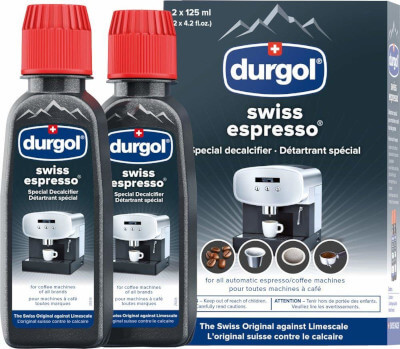
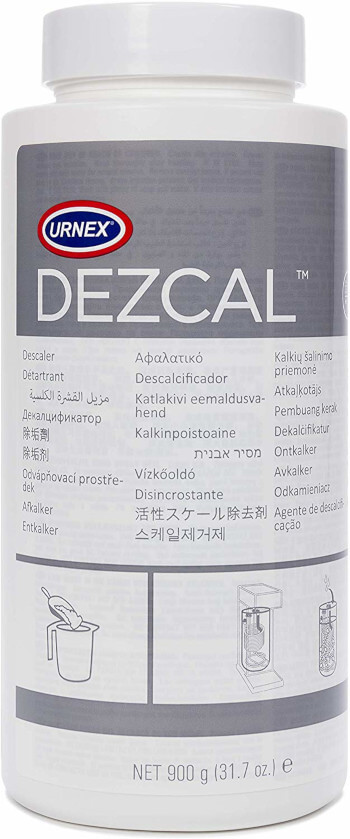
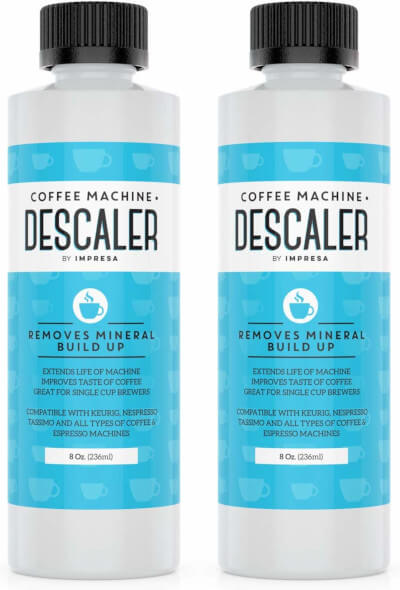
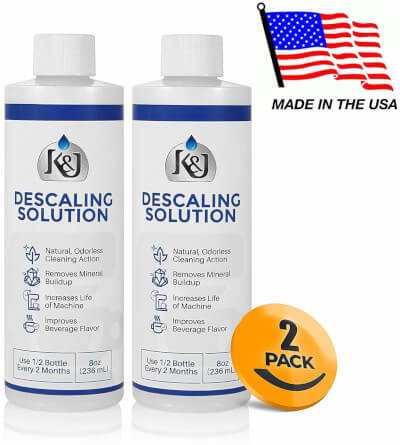
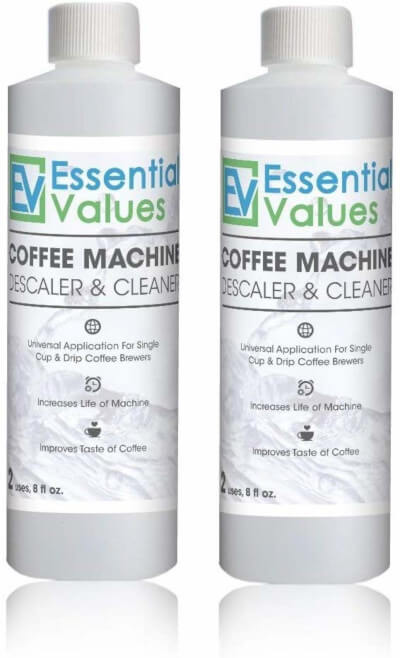
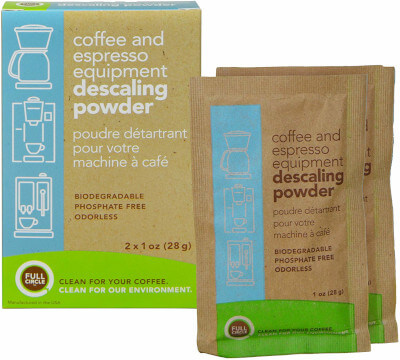
I think your article misses 1 important point. The overall is good anyway.
I believe the reason my Cuisinart coffee maker cannot produce anything other than VERY weak essentially colored water is that the water is not heating to high enough temperature. I believe this is due to scale buildup on the heating element. Do you think descaling with one of these would help? Thanks! great article!
Great tips, thanks very much! Where I live, only Durgol and Dezcal are available. Between the two, which would you recommend for the Nespresso Vertuoplus machine which is made out of “plastic and metal parts”.
Thank you for this great review. Hope you have a great day!
Thanks, Joe
Have a great day, yourself!